DISCLOSURE: VT condemns the horrific tragedy committed by the NAZI Party against Jewish Citizens of Europe during Word War II known as the "Holocaust". VT condemns all racism, bigotry, hate speech, and violence. However, we are an open source uncensored journal and support the right of independent writers and commentors to express their voices; even if those voices are not mainstream as long as they do NOT openly call for violence. Please report any violations of comment policy to us immediately. Strong reader discretion is advised.
…by Jonas E. Alexis
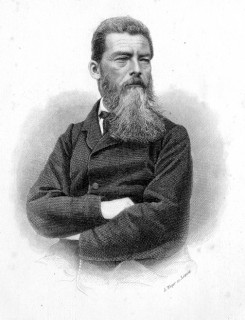
The idea that Christianity is a wish fulfillment has been adapted by a number of writers for a variety of reasons. Some of the reasons are so intellectually irresponsible and logically circular that one wonders whether those writers can actually be taken seriously. We will dispel some of those myths here. But what is the genesis of this idea?
The wish fulfillment idea was formulated by German philosopher Ludwig Feuerbach (1804-1872) in his book The Essence of Christianity, published in 1841—eighteen years prior to the publication of Darwin’s On the Origin of Species and thirty years prior to the Descent of Man.
Historically, the nineteenth century was essentially an intense philosophical period, when Europe was in a state of intellectual flux.
Arthur Schopenhauer’s The World as Will and Idea was released in 1819. Charles Lyell’s Principles of Geology, which was largely based on the ideas of James Hutton, came out in 1830, and had a monumental effect on Charles Darwin (he actually took Lyell’s Principles of Geology with him on his 1831 voyage).[1]
Karl Marx’s Communist Manifesto became popular roughly ten years before the publication of Origin of Species, but Marx dedicated subsequent editions of Communist Manifesto to Darwin. In 1862, three years after the release of Origin of Species, Moses Hess published his revolutionary work on Jewish racial superiority entitled Rome and Jerusalem.
Darwin sought to give an account of the origins of species (he never discussed the origin of species in his Origin of Species. And it was not the science that led Darwin to unbelief; it was the problem of evil.[2]).
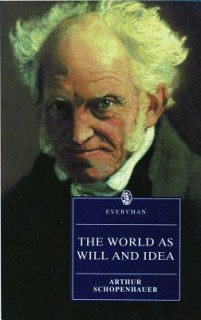 Francis Galton, Darwin’s cousin, sought to give an account of man’s intellectual faculties. Marx introduced a revolutionary/subversive way of seeing man and economics. When applied consistently, that subversive ideology led to massive death in Asian countries like China and Vietnam.[3] Lyell sought to redefine the distant past through uniformitarianism.
Francis Galton, Darwin’s cousin, sought to give an account of man’s intellectual faculties. Marx introduced a revolutionary/subversive way of seeing man and economics. When applied consistently, that subversive ideology led to massive death in Asian countries like China and Vietnam.[3] Lyell sought to redefine the distant past through uniformitarianism.
A generation later, “new” ideas about the illusory nature of religion began to crop up. Freud came out with The Interpretation of Dreams, and in The World as Will and Idea, Arthur Schopenhauer sought to propose “the real solution of the enigma of the world.”[4]
It could be argued that Feuerbach’s argument was the product of the nineteenth century, and it is pretty straightforward: religion is man-made, an invention of the mind that has no true significance in reality. As he put it, “Man is the beginning, the center and the end of religion.”
Suppose you want paradise to be true; all you have to do, according to Feuerbach’s sophisticated language, is to invent a paradise. If you want suffering to go away, all you have to do is to invent, say, something called heaven.
This, for Feuerbach, is the essence of Christianity. It is essentially based on wish fulfillment and has little to do with the real world as we know it.
The Essence of Christianity is a particularly good starting point if we are to fully understand the wish fulfillment idea and how it has been propagated in various ways by writers of various stripes. Before we do, however, I should point out that other writers through the ages have proposed similar ideas.

One of the most vociferous writers during the Enlightenment was Baron Paul-Henri Thiry d’Holbach, who wrote long and acerbic tirades against religion, mainly Christianity.[5]
Noted historian Will Durant writes that “From 1766 onward he organized a veritable factory of anti-Christian literature. In quick succession appeared Le Tableau des saints, De L’imposture sacerdotale, Pretes demasques, De la Cruaute religieuse, L’Enfer detruit; here was a new apostle of glad tidings—hell had been destroyed.”[6]
One observer, Emile Faguet, noted: “d’Holbach, more than Voltaire, more than Diderot, is the father of all the philosophy and all the anti-religious polemics of the end of the eighteenth and the first half of the nineteenth century.”[7]
Even Edward Gibbon, who was no friend of Christianity, wrote that “the philosophers of Paris ‘preached the tenets of atheism with the bigotry of dogmatists, and damned all believers with ridicule and contempt.’”[8]
Yet d’Holbach is far from alone. Thomas Hobbes (1588-1679), a contemporary of Rene Descartes,[9] proposed a closely similar view of religion in his classic work Leviathan. Leviathan, the Stanford Encyclopedia of Philosophy tells us that Leviathan “rivals in significance the political writings of Plato, Aristotle, Locke, Rousseau, Kant, and Rawls.”[10]
Hobbes is significantly known for the idea of the Social Contract, which was picked up by Rousseau in the eighteenth century in a book by the same title.
Hobbes wrote:
“Seeing there are no signs, nor fruit of religion, but in man only; there is no cause to doubt, but that the seed of religion, is also only in man; and consisteth in some peculiar quality, or at least in some eminent degree thereof, not to be found in any other living creatures.”[11]
 Hobbes went even further to say:
Hobbes went even further to say:
“Man observeth how one event hath been produced by another; and remembereth in them antecedence and consequences; and when he cannot assure himself of the true causes of things, he supposes causes of them, either such as his own fancy suggesteth; or trusteth the authority of other men, such as he thinks to be his friends, and wiser than himself.”[12]
Hobbes’s thesis on religion can be summed up this way: religion is built on four faulty premises. These premises are “opinion of ghosts, ignorance of second causes, devotion towards what men fear, and taking of things casual for prognostics.” In his own words, in these “consisteth the natural seed of religion.”[13]
Hobbes was much more of a materialist/determinist than anything else,[14] believing that emotion and feeling can be reduced to physical laws. In that materialist world, man ceases to be a moral agent, exercising his free will responsibly and according to reason. To use La Mettrie’s words, man is just a machine.
Although Ludwig Feuerbach was by no means the first thinker to examine Christianity in the nineteenth century, his ideas strongly influenced the postmodern culture. So let’s take a look at his ideas, as encapsulated in The Essence of Christianity.
FEUERBACH’S ESSENCE OF CHRISTIANITY AND ITS REFUTATION

In the first part of the book, Feuerbach labels religion as “the childlike condition of humanity,”[15] then says that “the object and contents of the Christian religion are altogether human.”[16]
Taking his arguments even further, Feuerbach states:
“Whatever strongly impresses a man, whatever produces an unusual effect on his mind, if it be only a peculiar, inexplicable sound or note, he personifies as a divine being.”[17]
From this principle, it follows that “Devils, witches, ghosts, angels, were sacred truths as long as the religious spirit held undivided sway over mankind.”[18]
This is fundamental to Feuerbach’s subsequent assertions, but we do not have to go very far to see that Feuerbach’s logic does not stand the test of his own principle.
If a man personifies as a divine being whatever impresses him, could it be that Feuerbach’s own perception of Christianity impresses him so much that he personifies it?
The totality of Feuerbach’s wish fulfillment theory can be summed up this way: people invent God because they cannot face life’s ultimate problems. In other words, they make stuff up because life is too hard. Feuerbach’s wish fulfillment is actually a rather infantile way of thinking.
First of all, the wish fulfillment idea does not give us a clear account of the truth about the world and the religious people Feuerbach intends to critique. For example, it is irrational and foolish for people to invent the idea of hell simply because they cannot cope with reality—the inescapable fact is that the idea of hell has never been portrayed as a haven for those who are desperate for help.
Moreover, people like Steven Pinker themselves make it clear that a person cannot invent something that threatens his environment.
Therefore, it simply makes no sense to use the wish fulfillment idea in order to disprove Christianity.
It can also be argued that wish fulfillment cannot give rational explanations for statements like “Thou shalt not commit adultery,” “Thou shalt not covet thy neighbor’s wife,” “Thou shalt not bear false witness against thy neighbor,” and so forth.
 Everyone, including people like Bertrand Russell, Aldous Huxley, H. G. Wells, Jean Paul Sartre, Margaret Sanger, Oscar Wilde, D. H. Lawrence, Arthur Schopenhauer, Friedrich Nietzsche, Shelley, Guy de Maupassant, Gustave Flaubert, Michel Foucault, Gore Vidal, Alfred Kinsey, and more recently even Stephen Hawking,[19] would strike out the prohibition against adultery. Lord Byron, Shelley’s contemporary, would brag about sleeping with at least two hundred women.[20]
Everyone, including people like Bertrand Russell, Aldous Huxley, H. G. Wells, Jean Paul Sartre, Margaret Sanger, Oscar Wilde, D. H. Lawrence, Arthur Schopenhauer, Friedrich Nietzsche, Shelley, Guy de Maupassant, Gustave Flaubert, Michel Foucault, Gore Vidal, Alfred Kinsey, and more recently even Stephen Hawking,[19] would strike out the prohibition against adultery. Lord Byron, Shelley’s contemporary, would brag about sleeping with at least two hundred women.[20]
Huxley was quite frank when he wrote:
“For myself, as, no doubt, for most of my contemporaries, the philosophy of meaninglessness was essentially an instrument of liberation. The liberation we desired was simultaneously liberation from a certain political and economic system and liberation from a certain system of morality. We objected to the morality because it interfered with our sexual freedom.”[21]
Huxley even went further to say that the reason d’Holbach’s atheist contemporary comrade La Mettrie formulated his materialistic worldview was not primarily because of intellectual reasons, but because his “predominantly erotic” desires compelled him to do so, as indicated at the end of La Mettrie’s L’Homme Machine.[22]
Let us cut to the chase here. What human being would invent such a no-escape law such as “Thou shalt not commit adultery”? Ask Pentheus in Euripides’ The Bacchae and he will say that lustful desires, which must be controlled by moral reasoning, is at the heart of every man. Even something less dear to our sin nature, like not taking the name of the Lord in vain, threatens our day-to-day dedication to the television.

Wish fulfillment once again does not have the intellectual mechanism and firepower to explain those laws because they threaten our environment. Thus, by induction, those laws seem to transcend nature and culture.
What kind of answer does Feuerbach provide for the logical impossibilities of his theory? Throughout his book, not only does he avoid responding to the real issue, but he also does not provide any meaningful engagement with classical Christian scholarship. The Essence of Christianity, like Thomas Paine’s The Age of Reason, is filled with assertions built upon assertions with little substance and rigorous historical and evidential inquiry.
Like Paine’s The Age of Reason, The Essence of Christianity avoids dealing with serious scholarship. Like Paine, Feuerbach seems to have little knowledge of historical Christianity and seems to have a vague history of some of its noted apologists such as Aquinas and Augustine.
Some scholars argue that Paine probably got some of his sources from David Hume,[23] whose position on miracles has now been abandoned by serious philosophical scholars.[24] Also, Paine’s The Age of Reason seems to be a reaction to his upbringing and environment, not a serious treatise or examination of Christianity.
This is evident by his claim that “we can know nothing of” the New Testament, “neither are we certain in what language they were originally written.”[25] It is foolish to even refute this claim and it shows that Paine had very little knowledge of historical Christianity. Then Paine added this idea to his weltanschauung:
“The study of theology, as it stands in the Christian churches, is the study of nothing; it is founded on nothing; it rests on no principles; it produces no authorities; it has no data; it can demonstrate nothing; and it admits of no conclusion.”[26]
Even atheist and agnostic historians such as Bart Ehrman, Michael Grant, John Dominic Crossan, would have taken issues with Paine here.[27] But Paine did not bother to elaborate those claims with historical experiment because the historical method would flatly refute some of his claims. Moreover, why would Paine waste his time on “the study of nothing”?
Paine propounds the idea that the history of Jesus “is altogether the work of other people.” How else? This assertion is again a mystification of history.
For example, how do we know that Socrates ever existed? Well, we only have two sources: Plato and Xenophon. But Paine, throughout his pamphlet, continued to make elementary errors and it is simply irrelevant to refute them all here.
One last point. Paine wrote:
“The idea that God sent Jesus to publish, as they say, the glad tidings to all nations, from one end of the earth unto the other, is consistent only with the ignorance of those who know nothing of the extent of the world, and who believed, as those world-saviours believed, and continued to believe for several centuries, that the earth was flat like a trencher…

“How was Jesus Christ to make anything known to all nations? He could speak but one language, which was Hebrew; and there are in the world several hundred languages…as to translations, every man who knows anything of languages, knows that it is impossible to translate from one language into another, not only without losing a great part of the original, but frequently of mistaking the sense…”
A freshman in linguistic or anthropology should be able to disprove this claim with little mental exercise. Once again, if Paine is correct, why do scholars spend years translating important documents into other languages? Why do we read Plato in English? It just doesn’t make sense, and it seems that Paine only applies this radical standard to things that he does not like.
In a nutshell, Feuerbach’s own version of Christianity seems to be an invention of his mind. As Alister McGrath, formerly of Oxford, writes:
“Feuerbach has not the slightest interest in the identity or history of Jesus Christ.
For him the character portrayed in the New Testament is simply a fantasy figure who endorses human hopes and aspirations…Feuerbach generalizes hopelessly about religions. He assumes (without any cogent argument or careful scholarship) that all the world religions have the same basic core components, which can all be explained on the basis of his atheistic projection theory…
“Feuerbach’s hypothesis is nothing more than a hypothesis. It does not rest on a rigorous experimental foundation but represents a series of dogmatic assertions about how we come to believe in God…On the basis of Feuerbach’s analysis, it is not only Christianity, but atheism itself, that can be regarded as a projection of human hopes.”[28]
SIGMUND FREUD AND WISH FULFILLMENT
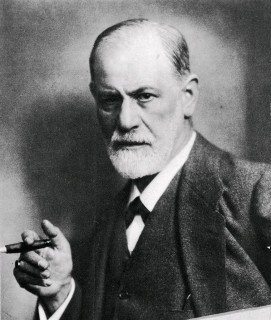
One individual who has picked up the wish fulfillment idea and eulogized it as a way of thinking and a subtle way of examining Christianity was Sigmund Freud. Had it not been for Freud, perhaps no one would have paid much attention to Feuerbach’s argument.
There are basically two sides of Freud: the “Jewish” side and the “atheist” side.
Freud used “atheism” in order to attack Christianity, but his ideology goes much deeper. Unfortunately we can only examine only one side here. But we will come back to this in a future article when we examine psychoanalysis.
Freud not only expanded Feuerbach’s ideas into the West, but he went even further to assert that religious ideas are “illusions, fulfillments of the oldest, strongest, and most urgent wishes of mankind.”[29] Freud also said:
“Christ is the heir of a wishful fantasy that remained unfulfilled.”[30]
However, just like Feuerbach, Freud failed to seriously engage Christianity. In his desperate attempt “to make a name for himself by discovering something important in either clinical or pathological medicine,”[31] Freud made it quite clear that he had little interest in facing the challenge posed by Christianity. He declared,
“I am reading books without being really interested in them, since I already know the results; my instinct tells me that.”[32] Alister McGrath comments:
“Freud’s theory concerning the origins of religion in the individual is, like that of Feuerbach, generally incapable of being tested. It is a hypothesis, not a fact. Freud could be said to lend psychoanalytical support to Feuerbach, but not to provide the crucial experimental data that would convert a hypothesis into a fact.”[33]
In the end, Freud’s analysis of Christianity also falls prey to unfulfilled wishes, the biggest of which is the atheist yearning for God to not exist.
This seems to be the case for many. Physicist Victor Stenger says:
“If [God] does exist, I personally want nothing to do with him.”[34] The late Christopher Hitchens likewise declares:
“It would be horrible if it were true that we were designed and then created and then continuously supervised throughout all our lives waking and sleeping and then continue to be supervised after our deaths—if that were true, it would be horrible…It would be like living in celestial North Korea. You can’t defect from [the] North but at least you can die. With monotheism they won’t let you die and get away from them. Who wants that to be true?”[35]

Hitchens is not alone. Aldous Huxley and his entourage had the same opinion. Consider, for example, mathematical physicist Paul Davies. In his gut, he knows very well that for the laws of physics to make sense, there had to be an outside force that created the universe, and he has made this point quite obviously in his book God and the New Physics. He writes:
“At the so-called Planck time (10-43 seconds) (which is the earliest moment at which the concept of space and time has meaning) the matching was accurate to a staggering one part in 1060. That is to say, had the [Big Bang] explosion differed in strength at the outset by only one part in 1060, the universe we now perceive would not exist.
“To give some meaning to these numbers, suppose you wanted to fire a bullet at a one-inch target on the other side of the observable universe, twenty billion light years away. Your aim would have to be accurate to that same part in 1060. If the universe is simply an accident, the odds against it containing any appreciable order are ludicrously small.”[36]
In other words, theists are perfectly rational in believing that this universe was created by a “super-intellect.” And it makes no sense for a person to hate someone who doesn’t even exist.
Listen to Denis Diderot, one of the renowned “atheists” and Freemasons during the Enlightenment: “I would sacrifice my life, perhaps, if I could annihilate forever the notion of God.”[37] Diderot was not alone.
Percy Bysshe Shelley added in a similar tone: “Oh! I burn with impatience for the moment of Xtianity’s dissolution. It has injured me; I swear on the altar of perjured love to revenge myself on the hated cause of the effect which even now I can scarcely help deploring.”[38]
KARL MARX, VLADIMIR LENIN, AND THE NEW ATHEISTS
There were two other candidates who absorbed the wish fulfillment idea: Karl Marx and Vladimir Lenin, two Jewish revolutionaries whose work we shall examine in the future.

Friedrich Engels, who had corroborated with Marx on The Kapitalist Manifesto, once declared: “We all became at once Feuerbachians.”[39]
Though Daniel Dennett seems to give a polished version of the wish fulfillment hypothesis, his ally Richard Dawkins takes the idea into a new hype. Dawkins dogmatically asserts:
“Faith, being belief that isn’t based on evidence, is the principal vice of any religion…
“Religious faith not only lacks evidence, its independence from evidence is its pride and joy, shouted from the rooftops. Why else would Christians wax critical of doubting Thomas? The other apostles are held up to us as exemplars of virtue because faith was enough for them. Doubting Thomas, on the other hand, required evidence. Perhaps he should be the patron saint of scientists.”[40]
He also says elsewhere: “Christianity, just as much as Islam, teaches children that unquestioned faith is a virtue. You don’t have to make the case for what you believe.
“If somebody announces that it is part of his faith, the rest of society, whether of the same faith, or another, or of none, is obliged, by ingrained custom, to ‘respect’ it without question; respect it until the day it manifests itself in a horrible massacre like the destruction of the World Trade Center, or the London or Madrid bombings.”[41]
The first thing a freshman in law or philosophy knows is that the worst way to deconstruct a system is to build a straw man and attack it with great relish. First, Dawkins twists the definition of Christianity into something entirely of his own making, which no Christian would take seriously.
What thinking Christian believes that faith is not based on evidence, or that evidence is not required for extraordinary claim? Why in the world would Christian thinkers like Aquinas, Peter Abelard, William of Ockham, Augustine, Anselm, to name just a few, would even spend their lives wrestling with philosophical and existential issues and trying to provide answers to them?
Second, Dawkins does not cite any sources for many of his wild claims, nor does he consult any serious thinking Christian who might believe his nonsense. In fact, Dawkins has been asked numerous times to defend his position publicly with Christian philosopher William Lane Craig, but he refused to do so.

Of all the New Atheists, I admire the late popularizer Christopher Hitchens and Peter Adkins of Oxford the most, for the very fact that they never recoiled from debating anyone, despite the fact that many of their assertions border on irrationality.[42] (I also like Adkins because he is one of the funniest atheists around.) But Richard Dawkins and other atheists such as A. C. Grayling have been an intellectual embarrassment for the movement in general.
Instead of debating the issues rationally, Dawkins prefers to use ad hominem tactics. Dawkins thinks that Craig has a “relentless drive for self-promotion.”[43]
But Dawkins will debate heavy-weight intellectuals and philosophically sophisticated people such as Ted Haggard. I am just kidding here. Ted Haggard is a Protestant pastor who was caught in a homosexual debacle back in 2006.
Craig has written a published critique of Dawkins’s elementary errors,[44] but Dawkins does not want to respond to them.
Craig was probably right when he said,
“My [atheist] friend Quentin Smith several years ago unceremoniously crowned Stephen Hawking’s argument against God in A Brief History of Time as ‘the worst atheistic argument in the history of Western thought.’
“With the publication of Richard Dawkins’ ‘central argument’ of his The God Delusion, the time has come, I think, to relieve Hawking of this weighty crown and to recognize Dawkins’ accession to the throne.”[45]
That Dawkins and Grayling in particular have refused to debate the issues in an academic forum was even noted by Oxford atheist Daniel Came.[46] Came wrote to Dawkins saying:
“The absence of a debate with the foremost apologist for Christian theism is a glaring omission on your CV and is of course apt to be interpreted as cowardice on your part. I notice that, by contrast, you are happy to discuss theological matters with television and radio presenters and other intellectual heavyweights like Pastor Ted Haggard of the National Association of Evangelicals and Pastor Keenan Roberts of the Colorado Hell House.”[47]
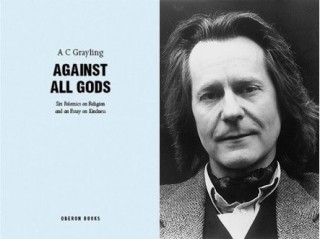 Even secular newspapers such as The Independent are now starting to see how A. C. Grayling’s pathetic rationalization does not make sense whatsoever,[48] given Grayling’s implacable credentials. He is the author of widely read books as Against all Gods, Meditations for the Humanist, and Scepticism and the Possibility of Knowledge.
Even secular newspapers such as The Independent are now starting to see how A. C. Grayling’s pathetic rationalization does not make sense whatsoever,[48] given Grayling’s implacable credentials. He is the author of widely read books as Against all Gods, Meditations for the Humanist, and Scepticism and the Possibility of Knowledge.
Yet Grayling is not willing to defend his position rationally, even though he is a member of the British Humanist Association, which holds the position that important issues must be discussed rationally, intelligently, and with evidence.
Polly Toynbee, president of the British Humanist Association, was scheduled to debate Craig on the existence of God,[49] but she declined after she saw some of Craig’s debates with other atheists.[50]
THE DELUDED?
The fact is that even many atheists wanted nothing to do with Dawkins’ The God Delusion. One atheist at Oxford University told Alister McGrath,
“Don’t judge the rest of us by this [The God Delusion] pseudo-intellectual drivel.”[51]
We saw in a previous article that agnostic philosopher Michael Ruse came to similar conclusion.[52]
Another atheist critic who has openly stated that there is something wrong with Dawkins’s work is David Sloan Wilson, an evolutionary biologist at Binghamton University. Wilson writes:
“Richard Dawkins and I share much in common. We are both biologists by training who have written widely about evolutionary theory. We share an interest in culture as an evolutionary process in its own right. We are both atheists in our personal convictions who have written books on religion…
“When Dawkins’ The God Delusion was published I naturally assumed that he was basing his critique of religion on the scientific study of religion from an evolutionary perspective. I regret to report otherwise. He has not done any original work on the subject and he has not fairly represented the work of his colleagues.”[53]
Along with his idea that religion is simply a “virus of the mind,” Dawkins has also developed a more sophisticated term called “meme,” which has been used by my colleague Yukon Jack here at VT.[54]
Just like genes can be passed on from one generation to the next, memes—an ever-adapting sort of genetic memory—we are told, can also be passed on from one person or group to the next. Dawkins first proposed this idea in The Selfish Gene.[55]
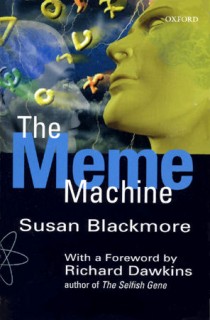 The fact is that the existence of genes can scientifically be observed and demonstrated. But, like “viruses of the mind,” the concept of the meme has no scientific validity whatsoever.
The fact is that the existence of genes can scientifically be observed and demonstrated. But, like “viruses of the mind,” the concept of the meme has no scientific validity whatsoever.
Meme was developed by Dawkins himself to describe ideas that he disliked. Massimo Pigliucci, an atheist and evolutionary biologist and philosopher at Stony Brook University, has provided a scientific and long refutation of Dawkins’ “meme.”[56] David Sloan Wilson did the same thing.[57]
Yet despite the fact that “meme” is essentially a scientific and intellectual embarrassment, it has spread it into the minds of many. Consider the following (representative) book titles:
The Meme Machine, by Susan Blackmore (Blackmore is no longer a proponent of the meme idea)
The Electric Meme: A New Theory of How we Think, by Robert Aunger
The Selfish Meme: A Critical Reassessment, by Kate Distin
Virus of the Mind: The New Science of the Meme, by Richard Brodie
The Mocking Memes: A Basis for Automated Intelligence, by Evan Louis Sheehan
(It must be noted that Blackmore no longer believes that “meme” provides an intellectually rigorous and fair representation of religion.[58])
Atheistic geneticist Dean Hamer writes: “Religion is based on memes, traditions of culture that are passed on not by DNA but by learning, instruction, and imitation.”[59]
In reviewing Hamer’s superfluous assertions, mathematician and philosopher David Berlinski humorously writes: “After comparing more than two thousand DNA samples, Dean Hamer concluded that a person’s capacity to believe in God is linked to his brain chemicals. Of all things! Why not his urine?

“Perhaps it will not be amiss to observe that Dr. Hamer has made the same claim about homosexuality, and if he has refrained from arguing that a person’s capacity to believe in molecular genetics is linked to a brain chemical, it is, no doubt, owing to a prudent sense that once that door is open, God knows how and when anyone will ever slam it shut again.”[60]
My challenge to those who keep propounding that Christianity is a meme is to produce rational defense for that proposition. It is a heavy burden and I do not think anyone has the intellectual firepower to carry that burden. They have to show that any Christian, including non-Zionists like myself, is literally deluded. In order to carry that heavy burden, the defense for the argument must be able to give logical and evidentiary foundation for the proposition.
Having read Yukon Jack’s article with great interest, I was hoping that he would produce enough evidence for much of his assertions, including the following: “Christians worship authority and state power, they defend the state even when the state commits genocide and does false flags to start wars.”[61]
The evidence? It was nowhere to be found. It is just a brute fact. It is self-evidently true, and no evidence is needed. Take it by faith.
I certainly would join Jack in fighting Christian Zionism, but to lump Christian Zionism with classical Christianity is a huge blunder. It is very similar to both the genetic fallacy and the fallacy of equivocation, logical errors that are found in nearly all introductory textbooks of philosophy.[62]
Suppose I believe that the earth is round but I happen to read that in an essay by Joseph Stalin. Should that lead to the conclusion that the belief is false because Stalin was largely responsible for extermination of more than fifty million people?
Another example of the genetic fallacy is the fallacious argument that if you were born in a Muslim country, you probably would be a Muslim; if you were born in America, you probably would be a Christian. What does that have to do with whether Islam or Christianity is true? Nothing.
Jack continues, “Christians are obviously living within a lie and thus are comfortable with lies of state.” Again, if he is referring to Christian Zionism here, I would agree. But there are blatant contradictions from Jack’s own writing. For example, he erroneously declares without evidentiary foundation that
“For Christians, murder is a sin, at least that’s what they want you to think about them. They are taught not to kill, murder is a grave sin, in the Catholic faith it is one of the mortal sins that can get you a ticket to hell unless you get forgiven by a priest. But if a Christian joins the United States Army and kills Muslims then he doesn’t consider that a sin or murder but duty. Christians can kill and be praised for killing so long as they do it for the state.”
Here’s the kicker: Jack believes that “Israel should be bombed back to the Stone Age”![63] While I believe that Israel has enormous control over much of the Western world, I do not believe for a second that the country should be bombed.
Should we turn into monsters because our mortal enemy is a monster? Shouldn’t we appeal to a higher moral standard when we fight the Zionist venom which never ceases to seduce the Western world with their lies and propaganda?

I was quite moved by one commentator’s point in response to Jack’s article: “The problem with fighting monsters is that you become gradually one yourself, then what are you fighting for if you are just going to replace an evil with another?”
My second challenge is that the question of whether Christianity is true or false is a very difficult question upon which brilliant people can rationally disagree without calling each other names or without appealing to emotional reactions. Therefore it is highly presumptuous of anyone to keep saying that Christianity or any other religion is false without rigorous evidence.
It seems that Jack understands that evidence is to be demanded, therefore he makes extraordinary claims with an appeal to “a growing consensus of scholars.” He writes:
“Jesus is a fictional character created by Jewish writers under the auspices of Roman authorities says a growing consensus of scholars.” The scholars? They are none other than Joseph Atwill and Acharya S. I do not know if Jack knew that agnostic/atheist historian Bart Ehrman has written a book analyzing many of those ridiculous claims.[64]
Serious scholars working in the field of the Greco-Roman world simply do not pay attention to those fallacious arguments anymore precisely because it makes a serious and fair critique of Christianity incoherent and historically irresponsible.[65]
If he is aware of Ehrman’s book, I wonder why it was not mentioned at all in his article.
I personally am amazed to see how many people, including thinking people, would gravitate toward an argument that will make their case historically indefensible and rationally deleterious.
For example, how do we know that Socrates ever existed? There are only two existing sources about his life: Plato and Xenophon. Yet everyone acknowledges that he existed. Similarly, how do we know that Jesus Christ ever existed? Every serious historian (even those who were hostile toward Christianity) acknowledges that Christ’s earthly existence is a historical point. This group includes pagan Greek philosophers, Roman historians, non-Christian Jews, etc.
However, while dishonest skeptics would never question Socrates’s existence, many have spent countless hours convincing themselves that Jesus Christ never existed! (The late Christopher Hitchens, in order to get around this, proposed that Socrates may never have existed either!) As noted historian-sociologist Rodney Stark puts it,
“But the concerns for independent, nonbiblical sources [for the historicity of Jesus Christ] shrink to unimportant quibbles when weighed against the utter implausibility that, as the great Shirley Jackson Case (1872-1947) put it, ‘a company of people claiming to have been companions of a fictitious [savior would continue] reverencing him even to the point of sacrificing their lives for his cause.’ Hence, today only dedicated atheist writers cling to the notion that Jesus never existed.”[66]
The idea that Jesus never existed is a recent development that really started in the nineteenth century by Bruno Bauer. In the eighteenth century, there were just a few people who were propounded this idea, but no one really paid attention to them. In fact, Voltaire himself declared that those people were “more ingenious than learned.”[67] Moving on to our era, John Dominic Crossan, himself an atheist,[68] declares,
“Jesus’ death by crucifixion under Pontius Pilate is as sure as anything historical can ever be. For if no follower of Jesus had written anything for one hundred years after his crucifixion, we would still know about him from two authors not among his supporters. Their names are Flavius Josephus and Cornelius Tacitus.”[69]

Jonas E. Alexis has degrees in mathematics and philosophy. He studied education at the graduate level. His main interests include U.S. foreign policy, the history of the Israel/Palestine conflict, and the history of ideas. He is the author of the new book Zionism vs. the West: How Talmudic Ideology is Undermining Western Culture. He teaches mathematics in South Korea.
ATTENTION READERS
We See The World From All Sides and Want YOU To Be Fully InformedIn fact, intentional disinformation is a disgraceful scourge in media today. So to assuage any possible errant incorrect information posted herein, we strongly encourage you to seek corroboration from other non-VT sources before forming an educated opinion.
About VT - Policies & Disclosures - Comment Policy



